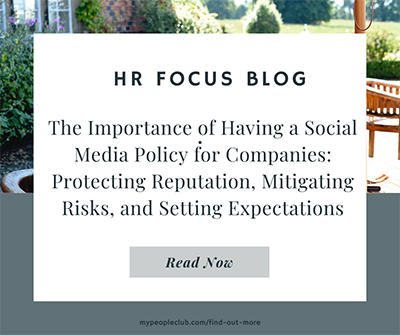The importance of social media impacting on businesses has yet again been thrust into the spotlight (Gary Lineker tweets anyone?!), pulling into question how and why companies should have a social media policy in place and ensure employees understand it.
I’ve lost count of the number of issues I’ve dealt with for clients on social media use in the workplace, I actively encourage all my clients to create a strong social media policy and include it in employee handbooks. It’s also useful to remind employees regularly on the policy too.
With social media becoming such an integral part of our daily lives, the lines between home and work have become blurred. As such, it has also become a critical component of many businesses to establish a clear and comprehensive social media policy. In this blog post, I’ll explore the reasons why having a social media policy is essential for companies.
Firstly, you will want to protect your company reputation: A social media policy helps you to achieve this by setting clear guidelines for what employees can and cannot post on social media. This ensures that employees do not post anything that could damage the company’s brand or reputation.
Ensures Consistency: By establishing your guidelines for how employees should represent the company on social media, a social media policy helps ensure that messaging is consistent and on-brand and this is what we’ve seen recently with the BBC.
Now, here’s a biggie it can mitigates legal risks: by outlining what is acceptable and unacceptable behaviour on social media it can help prevent employees from posting anything that could result in legal action against the company, such as defamatory statements or sharing confidential information, and in some cases we’re seeing, with fake news.
Sets Expectations: This is one area I encourage clients to spend some time on, by setting clear expectations for employees about their social media use while at work, you can prevent having those difficult conversations down the line. This includes guidelines for when and how social media can be used during working hours, as well as what employees can and cannot post about their job on social media. Believe me, this is one areas I’ve had so many conversations about, the issues that can arise can be a real headache for leaders and business reputation too.
Encourages Positive Engagement: If you’re a business that actively engages with clients/ suppliers or customers online then this is a must! Outlining how employees should engage with customers and stakeholders on social media, and establishing guidelines for positive and respectful engagement, a social media policy can help build trust and goodwill with customers and stakeholders. I’m a huge fan of the Aldi Twitter account, and think they’ve spent a huge amount of time getting this area right. If you haven’t seen their tweets head over an take a peek, you won’t be disappointed.
For me, having a social media policy is an essential part of a company’s HR Toolkit especially in today’s digital age. It not only helps protect a company’s reputation, ensures consistency, mitigates legal risks, protects employee privacy, sets expectations, it can encourages positive engagement within teams, with customers and suppliers alike.
By establishing clear guidelines for its use, you can really harness the power of social media while minimizing the risks. It’s a great tool to use if used well!
Feeling lost in the social media jungle?
Fear not, we’ve got your back!
Our Social Media Sample Policy is ready and waiting for action. Written by HR for HR, it’s the perfect tool to navigate the treacherous terrain of social media with ease. So, grab a vine and swing on over to our platform to get started! – www.MyPeopleClub.com/Find-Out-More

